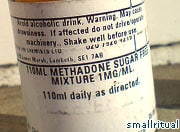Drug addicts should not be allowed to stay on drug substitutes like methadone indefinitely, according to the government body responsible for drug treatment.
The National Treatment Agency for Substance Misuse (NTA) says its aim is to rebalance the system and “ensure that successful completion and rehabilitation is an achievable aspiration for the majority in treatment”.
An estimated 330,000 people in England and Wales are currently addicted to heroin, crack cocaine or both, of which more than 200,000 are in contact with treatment agencies.
Scrapped
However most of these people are being ‘maintained’ on substitutes like methadone at a cost of £300m a year, according to The Guardian.
A report by the Centre for Social Justice, the think-tank set up by former Tory leader Iain Duncan Smith, has called for the NTA to be scrapped amid claims that only 4 per cent of drug addicts are emerging clean from treatment.
Whilst the NTA disputes this figure, it has accepted that it needs to revise its approach in view of the change of government.
In draft changes to its business plan the Agency has said: “We intend to take forward the government’s ambition for a rapid transformation of the treatment system to promote sustained recovery and get more people off illegal drugs for good.”
Abstinence
“No-one should be ‘parked’ indefinitely on methadone or similar opiate substitutes without the opportunity to get off drugs.
“New clinical protocols will focus practitioners and clients on abstinence as the desired outcome of treatment, and time-limits on prescribing will prevent unplanned drift into long-term maintenance”, the report continues.
Recent studies show that residential-based abstinence programmes lasting at least a month have a one-in-four success rate, but after three years on methadone only three per cent of addicts are drug-free.
Financial
However commentators have pointed out that the methadone industry itself is lucrative.
Professor Neil McKeganey, who works at the Centre for Drug Misuse at the University of Glasgow, has previously commented that: “There’s considerable financial incentive that drug users remain drug dependent.”
In March The Times reported that GPs in many parts of the country get paid around £220 per methadone patient per year and that pharmacists can get £200 administration fees plus about £1.50 per administered dose.
And in February drugs expert Prof McKeganey said: “it is clear that the system itself is addicted to supplying methadone to heroine addicts.”

